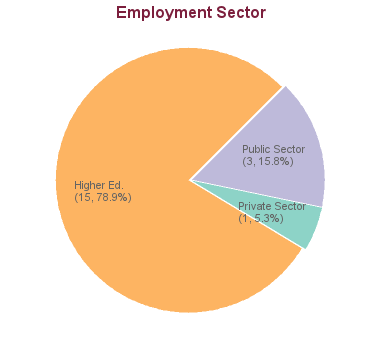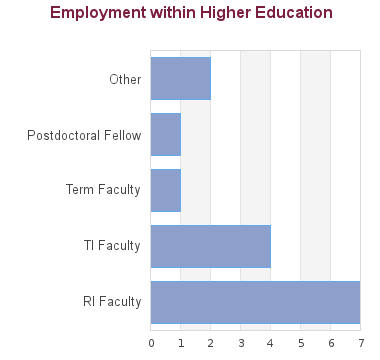Canadian Immigration Updates
Review details about the recently announced changes to study and work permits that apply to master’s and doctoral degree students. Read more
Overview
The Human Development, Learning, and Culture (HDLC) program at UBC advances research and practice in education through the application of theoretical models and concepts to real world educational issues. Investigations of learning and developing, including the unique contributions of culture to these processes, are applied widely to classroom, afterschool, work, and digital contexts. This work is interpreted through a variety of theoretical lenses (e.g., sociocultural, social and emotional, cognitive). Coursework emphasizes three primary areas: a) learning and developing, b) culture and diversity, and c) research methods, including both qualitative and quantitative research.
Doctoral students are encouraged to participate in research and teaching opportunities throughout their program; it is likely that some of these opportunities may form part of a funding package.
Quick Facts
Program Enquiries
Contact the program
Admission Information & Requirements
1) Check Eligibility
Minimum Academic Requirements
The Faculty of Graduate and Postdoctoral Studies establishes the minimum admission requirements common to all applicants, usually a minimum overall average in the B+ range (76% at UBC). The graduate program that you are applying to may have additional requirements. Please review the specific requirements for applicants with credentials from institutions in:
Each program may set higher academic minimum requirements. Please review the program website carefully to understand the program requirements. Meeting the minimum requirements does not guarantee admission as it is a competitive process.
English Language Test
Applicants from a university outside Canada in which English is not the primary language of instruction must provide results of an English language proficiency examination as part of their application. Tests must have been taken within the last 24 months at the time of submission of your application.
Minimum requirements for the two most common English language proficiency tests to apply to this program are listed below:
TOEFL: Test of English as a Foreign Language - internet-based
Overall score requirement: 90
Reading
22
Writing
21
Speaking
21
Listening
22
IELTS: International English Language Testing System
Overall score requirement: 6.5
Reading
6.0
Writing
6.0
Speaking
6.0
Listening
6.0
Other Test Scores
Some programs require additional test scores such as the Graduate Record Examination (GRE) or the Graduate Management Test (GMAT). The requirements for this program are:
The GRE is not required.
2) Meet Deadlines
September 2026 Intake
Application Open Date
19 September 2025Canadian Applicants
International Applicants
3) Prepare Application
Transcripts
All applicants have to submit transcripts from all past post-secondary study. Document submission requirements depend on whether your institution of study is within Canada or outside of Canada.
Letters of Reference
A minimum of two references are required for application to graduate programs at UBC. Each graduate program determines the type of reference (e.g. academic, professional) and number of references they require which can range from 2 to 4. References should be requested from individuals who are prepared to provide a report on your qualifications for the program.
Statement of Interest
Many programs require a statement of interest, sometimes called a "statement of intent", "description of research interests" or something similar.
Supervision
Students in research-based programs usually require a faculty member to function as their thesis supervisor. Please follow the instructions provided by each program whether applicants should contact faculty members.
Instructions regarding thesis supervisor contact for Doctor of Philosophy in Human Development, Learning, and Culture (PhD)
Citizenship Verification
Permanent Residents of Canada must provide a clear photocopy of both sides of the Permanent Resident card.
4) Apply Online
All applicants must complete an online application form and pay the application fee to be considered for admission to UBC.
Tuition & Financial Support
Tuition
| Fees | Canadian Citizen / Permanent Resident / Refugee / Diplomat | International |
|---|---|---|
| Application Fee | $116.25 | $168.25 |
| Tuition * | ||
| Installments per year | 3 | 3 |
| Tuition per installment | $1,875.34 | $3,294.66 |
| Tuition per year (plus annual increase, usually 2%-5%) | $5,626.02 | $9,883.98 |
| Int. Tuition Award (ITA) per year (if eligible) | $3,200.00 (-) | |
| Other Fees and Costs | ||
| Student Fees (yearly) | $1,144.10 (approx.) | |
| Costs of living | Estimate your costs of living with our interactive tool in order to start developing a financial plan for your graduate studies. | |
All fees for the year are subject to adjustment and UBC reserves the right to change any fees without notice at any time, including tuition and student fees. Tuition fees are reviewed annually by the UBC Board of Governors. In recent years, tuition increases have been 2% for continuing domestic students and between 2% and 5% for continuing international students. New students may see higher increases in tuition. Admitted students who defer their admission are subject to the potentially higher tuition fees for incoming students effective at the later program start date. In case of a discrepancy between this webpage and the UBC Calendar, the UBC Calendar entry will be held to be correct.
Financial Support
Applicants to UBC have access to a variety of funding options, including merit-based (i.e. based on your academic performance) and need-based (i.e. based on your financial situation) opportunities.
Program Funding Packages
From September 2024 all full-time students in UBC-Vancouver PhD programs will be provided with a funding package of at least $24,000 for each of the first four years of their PhD. The funding package may consist of any combination of internal or external awards, teaching-related work, research assistantships, and graduate academic assistantships. Please note that many graduate programs provide funding packages that are substantially greater than $24,000 per year. Please check with your prospective graduate program for specific details of the funding provided to its PhD students.
Funding Statistics
This results in a net balance (any funding provided to the student minus tuition and fees) mean of $32,939 and median of $31,521.
- 2 students received Teaching Assistantships. Median TA funding based on 2 students was $16,143.
- 2 students received Research Assistantships. Median RA funding based on 2 students was $1,725.
- 2 students received Academic Assistantships. Median AA funding based on 2 students was $12,096.
- 5 students received internal awards. Median internal award funding based on 5 students was $24,869.
- 2 students received external awards. Median external award funding based on 2 students was $27,500.
Review methodology
Scholarships & awards (merit-based funding)
All applicants are encouraged to review the awards listing to identify potential opportunities to fund their graduate education. The database lists merit-based scholarships and awards and allows for filtering by various criteria, such as domestic vs. international or degree level.
Graduate Research Assistantships (GRA)
Many professors are able to provide Research Assistantships (GRA) from their research grants to support full-time graduate students studying under their supervision. The duties constitute part of the student's graduate degree requirements. A Graduate Research Assistantship is considered a form of fellowship for a period of graduate study and is therefore not covered by a collective agreement. Stipends vary widely, and are dependent on the field of study and the type of research grant from which the assistantship is being funded.
Graduate Teaching Assistantships (GTA)
Graduate programs may have Teaching Assistantships available for registered full-time graduate students. Full teaching assistantships involve 12 hours work per week in preparation, lecturing, or laboratory instruction although many graduate programs offer partial TA appointments at less than 12 hours per week. Teaching assistantship rates are set by collective bargaining between the University and the Teaching Assistants' Union.
Graduate Academic Assistantships (GAA)
Academic Assistantships are employment opportunities to perform work that is relevant to the university or to an individual faculty member, but not to support the student’s graduate research and thesis. Wages are considered regular earnings and when paid monthly, include vacation pay.
Financial aid (need-based funding)
Canadian and US applicants may qualify for governmental loans to finance their studies. Please review eligibility and types of loans.
All students may be able to access private sector or bank loans.
Foreign government scholarships
Many foreign governments provide support to their citizens in pursuing education abroad. International applicants should check the various governmental resources in their home country, such as the Department of Education, for available scholarships.
Working while studying
The possibility to pursue work to supplement income may depend on the demands the program has on students. It should be carefully weighed if work leads to prolonged program durations or whether work placements can be meaningfully embedded into a program.
International students enrolled as full-time students with a valid study permit can work on campus for unlimited hours and work off-campus for no more than 24 hours a week during academic sessions.
A good starting point to explore student jobs is the UBC Work Learn program or a Co-Op placement.
Tax credits and RRSP withdrawals
Students with taxable income in Canada may be able to claim federal or provincial tax credits.
Canadian residents with RRSP accounts may be able to use the Lifelong Learning Plan (LLP) which allows students to withdraw amounts from their registered retirement savings plan (RRSPs) to finance full-time training or education for themselves or their partner.
Please review Filing taxes in Canada on the student services website for more information.
Cost Estimator
Applicants have access to the cost estimator to develop a financial plan that takes into account various income sources and expenses.
Career Outcomes
21 students graduated between 2005 and 2013: 1 is in a non-salaried situation; for 1 we have no data (based on research conducted between Feb-May 2016). For the remaining 19 graduates:


RI (Research-Intensive) Faculty: typically tenure-track faculty positions (equivalent of the North American Assistant Professor, Associate Professor, and Professor positions) in PhD-granting institutions
TI (Teaching-Intensive) Faculty: typically full-time faculty positions in colleges or in institutions not granting PhDs, and teaching faculty at PhD-granting institutions
Term Faculty: faculty in term appointments (e.g. sessional lecturers, visiting assistant professors, etc.)
Sample Employers in Higher Education
University of British Columbia (4)University of Alberta
Saint Mary's University
Western University (Ontario) - King's University College
Northwest Community College
Simon Fraser University
University of Northern British Columbia
Wilfrid Laurier University
Dowling College
McGill University
Sample Employers Outside Higher Education
State of Arizona - First Things FirstStatistics Canada
Fraser Health
Sample Job Titles Outside Higher Education
Research and Evaluation Project DirectorEvaluator/Researcher
Social Science Researcher
Substance Use\Mental Health Youth and Family counsellor
PhD Career Outcome Survey
You may view the full report on career outcomes of UBC PhD graduates on outcomes.grad.ubc.ca.Disclaimer
This program underwent a name or structural change in the study time frame, and all alumni from the previous program were included in these summaries. These data represent historical employment information and do not guarantee future employment prospects for graduates of this program. They are for informational purposes only. Data were collected through either alumni surveys or internet research.Enrolment, Duration & Other Stats
These statistics show data for the Doctor of Philosophy in Human Development, Learning, and Culture (PhD). Data are separated for each degree program combination. You may view data for other degree options in the respective program profile.
ENROLMENT DATA
| 2023 | 2022 | 2021 | 2020 | 2019 | |
|---|---|---|---|---|---|
| Applications | 17 | 23 | 27 | 31 | 16 |
| Offers | 2 | 2 | 1 | 2 | 2 |
| New Enrolment | 2 | 0 | 1 | 1 | 2 |
| Total Enrolment | 14 | 18 | 22 | 24 | 29 |
Completion Rates & Times
Disclaimer
Research Supervisors
Supervision
Students in research-based programs usually require a faculty member to function as their thesis supervisor. Please follow the instructions provided by each program whether applicants should contact faculty members.
Instructions regarding thesis supervisor contact for Doctor of Philosophy in Human Development, Learning, and Culture (PhD)
Advice and insights from UBC Faculty on reaching out to supervisors
These videos contain some general advice from faculty across UBC on finding and reaching out to a supervisor. They are not program specific.
Doctoral Citations
| Year | Citation |
|---|---|
| 2015 | Dr. Kojima studied the mobility of Asian migrants who are sexual minorities in Vancouver, including Gay and Bisexual. His ethnographic study critically documents how race, gender and sexuality shape the politics of belonging in transnational contexts. The study adds to the theorizing about sexual citizenship, multiculturalism and immigration in Canada. |
| 2014 | Dr. Khan examined the experiences of both clients and counsellors who engage in online therapy, that is counselling over the Internet. This study highlights new developments in counselling using the world wide web. It also addresses the gap in services in certain geographic areas, and ethical implications related to privacy and standards of practice. |
| 2014 | Dr. Collie examined work-related well-being and motivation among teachers. Her research showed that contextual factors, such as the support of school principals, play a key role in positive teacher functioning. She also found that teacher well-being and motivation play an important role in the teachers' commitment and job satisfaction. |
| 2014 | Dr. Sweiss examined how Vancouver children spend their time after school and how participation in different programs and activities is related to their well-being. She found that children who participated in a combination of several programs and activities had higher levels of well-being than children who participated in only a few activities. |
| 2014 | Dr. Darwich examined early adolescents and their ethnic and Canadian identity, sense of belonging at school, and experiences with discrimination. She found that higher levels of discrimination were linked to lower levels of school belonging. Her conclusion that youth new to Canada have a lower sense of belonging has implications for their education. |
| 2013 | Dr. Hutchinson examined how young children learn to regulate emotions, learning, and social interactions in classrooms. She found classroom tasks and teacher support were essential in children's developing self-regulation. Her study adds to growing evidence indicating the importance of self-regulation for children's success in the early school years. |
| 2013 | Dr. Oberle examined factors that relate to positive development and resilience in early adolescence. Her research showed that family, school, and community support are crucial for positive growth in youth. She also found that the social and emotional competencies of young adolescents are critically related to their academic success in school. |
| 2012 | Dr. Colling used photos and stories captured by research participants to develop a model of acculturation to explore Canadian identity and culture change processes. Her framework for examining cross-cultural transitions explored culture change among Canadians, as well as newcomers to Canada. Narratives voiced by participants hold potential implications for Canada's multiculturalism policy. |
| 2012 | Dr. Larstone examined the relationships between personality and antisocial and aggressive behaviour among adolescents. Her research highlights the importance of considering both normal and abnormal personality characteristics as well as gender differences in personality in understanding the development of different kinds of antisocial behaviour. |
| 2011 | Dr. Jhangiani investigated Punjabi immigrant women's conceptions of mental health and how they accessed the mental healthcare system. Her research demonstrates that participants would benefit from multilingual mental health services, outreach via multiple channels, and mental health information being dispensed by their general practitioners. |
Pages
Further Information
Specialization
The Human Development, Learning, and Culture (HDLC) program at UBC addresses the interface of research and practice in education, weaving together theoretical models and concepts in their application to real world educational issues. Investigations of learning and development, including the unique contributions of culture to these processes, are applied to a wide range of contexts including classroom, afterschool, work, and technological contexts. This work is interpreted through a variety of theoretical lenses (e.g., cognitive, sociocultural, and social and emotional development).
Coursework emphasizes three primary areas: a) learning and development; b) culture and diversity; and c) research methods, including qualitative and quantitative, experimental and developmental.
Program Website
Faculty Overview
Program Identifier
Classification
September 2026 Intake
Program Enquiries
Contact the program
Departments/Programs may update graduate degree program details through the Faculty & Staff portal. To update contact details for application inquiries, please use this form.

Considering UBC for your graduate studies?
Here, you can choose from more than 300 graduate degree program options and 2000+ research supervisors. You can even design your own program.




